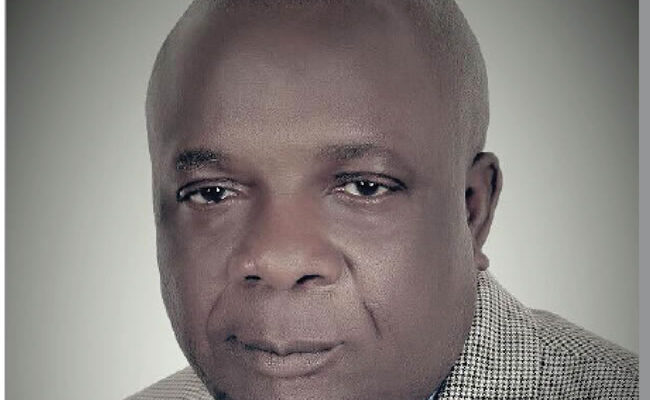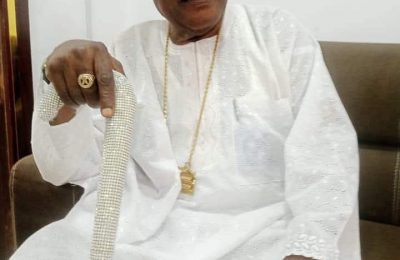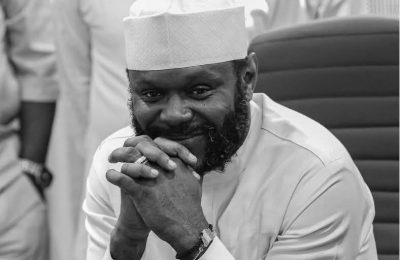
Dr David Olusegun Olanipekun, former political editor of News Agency of Nigeria (NAN) and founding director of public communication at Covenant University, Ota, Ogun State, is an adjunct faculty and communication consultant in the United States. He told his life story to TUNDE ADELEKE.

As an image maker of a frontline Christian mission institution, the Covenant University, you pulled out and left Nigeria, what informed your decision?
Exigencies of life such as family demands, opportunities and the desire to explore other possibilities led to it. For me, it was not an ‘escapist’ decision or what the young people call Japa. My decision to travel was premised upon a well thought-out plan to provide better opportunities for my children, to give them a better and more critical and comprehensive worldview. As you know, our final location or destination as Christians should not essentially be our God-given place of birth. The Scriptures say we are to dominate the earth, not just a portion of it. So, relocating from your country of birth or village or hometown or changing job location is also the will of God. Remember the Bible patriarchs like Abraham, Isaac and Jacob did similar things in their lives. While the Covenant University experience was a worthwhile professional upgrade after practising journalism for more than two decades in print, television and news wire, this foreign sojourn has richly added value to my worldview.
How was it at Covenant University?
At Covenant University, I was privileged to pioneer its corporate and public affairs department and with the grace of God and the support of the leadership of the young university then, my team catapulted its reputation to a place of envy within a short period of about three to four years of its founding. The private mission school became an instant success, a toast of, and the first choice among students seeking acceptances to tertiary educational institutions in Nigeria and from some other African countries.
How is life while teaching in a foreign institution?
My workload here is not strictly pedagogy, but a mix of adjunct college faculty responsibilities and communication consulting. This choice gives me the option to optimally programme and utilise my scheduling. As for college teaching, the tools are basically the same universally. However, differences and problems emanate from unequal access to [ those tools] depending on location, situation and resources. A teacher does basically three pivotal things: teaching, research and community service. Scholarship is essentially about pedagogy. A teacher tries always to translate theories to practice by citing field examples and experiences to enrich his or her classroom work. In this era of smart technology, teaching has become more visualised, rather than audio-based or verbalised. Many formats of classroom communication are readily more available to teachers in their interface and interaction with students, unlike in the past when emphasis was on note, rote and the blackboard. Audio, smart boards, videos, clips, graphics, visuals, webcasts and others, these emerging dominant teaching templates make the classroom ecosystem a sort of a reciprocal knowledge receptacle. The teacher is not just a repository of knowledge while the students are just mere receiving hordes to reference a critical idea from the renowned Paulo Freire in his seminal work, Pedagogy of the Oppressed. With this in mind, knowledge has become a shared experience or put in a laboratory term, a shared experiment. In other words, no teacher now has a ‘monopoly’ of knowledge as it was perceived in the olden days. Knowledge has become an enterprise that is operationalised in a shared milieu. So, the emphasis these days is focused more on one’s competence in his or her teaching area; which pushes the demographics, racial or ethnic composition of your students into a secondary place. This is not to say that race, creed or colour don’t matter. But the fact remains universal that ‘students are students everywhere with their well-known pranks and tricks.’ The only significant difference is cultural. Once a teacher is sensitive, understands, respects and is readily adaptable to the cultural nuances of a new environment, he or she is good to go. Therefore, the issue of how difficult it is to impart knowledge to white or black or brown students takes the back seat. What is imperative is the scope and depth of your knowledge in your teaching remit. The other part of my workload is in consulting. I run a consulting firm which engages in coaching and training sessions for communication personnel (various cadres of communication professionals both in Nigeria and overseas).
How was your growing up?
Growing up initially was in rural Kwara State. My roots are proudly located in the Oke-Ero Council Area of the state where most of the people engage in agrarian occupation. Life was rustic as a child in the late 50s and early 60s – no electricity, no pipe-borne water in the town then – but still good, wild and exciting. We had fun, plenty of it, on the farm, in the hunting fields and in primary school while growing up in Idofin Igbana, my hometown. A number of festivals and festivities, moonlight plays and pranks to occupy our exuberant childish life; a roller coaster of unending seasonal life of fun and fanfare. Exciting memories still tickle me now about those bygone days.
What about schooling?
There was an initial reluctance to go to school as a kid. This is because of the numerous attractions in the village to occupy one’s time. The festivals, the farms and its fresh foods, the streams, the rivers, the unexplored forests for their games and the peer hunting expeditions in our neck of the woods. However, the credit of my education should go mostly to my father (now late), who insisted that I had no option, but to be in school. His decision was a great sacrifice those days as I was his only surviving son. The usual norm then was to see sons as additional new hands in farm activities. Primary or elementary school was in Idofin. I also attended Government Secondary School, Omu-Aran, for my WASCE and swiftly moved to Offa Grammar School for my Higher School Certificate (HSC), all in the present day Kwara. I obtained my Bachelor of Science in Mass Communication at the University of Lagos in 1979. Later, I got my Master’s in International Relations from the then University of Ife (now Obafemi Awolowo University) and decades later, a PhD in Mass Communication and Media Studies from Howard University, Washington DC, specialising in communication, social construction and identity framing. Indeed, my academic journey has been an accumulation of diplomas and certificates from different cultural locations; a route that has undoubtedly enriched my teaching skills and professional perspectives.
Can you take us through your career journey?
Career wise, I have crossed the major traditional platforms of the media, namely, television, print and news wire. After graduation and my NYSC service at the News Agency of Nigeria (NAN), Benin, I was at the NTA Ilorin as a reporter/news editor. Then, I was appointed the Kwara State correspondent/editor of the then newly-founded The Democrat newspaper with its headquarters in Kaduna. In 1984, I came back to NAN after my Master’s programme at Ife where my professional reportorial career terminated in 1997 as the agency’s political editor. I must state here that I left NAN on my own volition to explore other professional possibilities. In NAN, I covered a number of beats, notable among which were politics and the maritime. I was also the agency’s bureau chief in Sokoto State (now Sokoto, Kebbi and Zamfara states) for about three to four years. In addition, I covered periodic overseas assignments for the agency in such places as Poland, Kenya and had a USIS fellowship that took me to the United States in 1991 on attachment to the Fort-Worth Star Telegram newspaper in Texas at both its Washington DC bureau and head office in Fort Worth. On leaving NAN, I was privileged to found, along with people of progressive like-minds, a community newspaper, Kwara NewsTimes, to service the news needs and serve as a conversation platform to set an agenda for our people in Kwara, my state of origin. The present Minister of Information and Culture, Alhaji Lai Mohammed, was the chairman of the newspaper’s board while I was privileged to serve as its editor-in-chief and chief executive officer. A well known veteran journalist, Mr Niyi Adekeye, was its editor. This time was the turbulent era following the annulment of the 1993 June 12 election and the uncertainties accompanying the seemingly endless political transition programme by the military junta in Nigeria. It was a season of unpredictable political direction for the nation. We ran the paper for about three years. From here, I moved to the corporate communications world in 2000, first as a Special Assistant to Bishop David Oyedepo, also serving concurrently as the head of the editorial division of the Living Faith Church Worldwide (aka Winners Chapel), one of the largest church ministries in the world. I was in this position for about three years before I was seconded to found the public communications department of the ministry’s newly established mission university, Covenant University.
You must have seen some attributes in your spouse before settling for her as your choice. How did it go?
My wife, Mrs Abigail Abiola Olanipekun, has been my first love ever since, even before we tied the nuptial knots. We grew up in the same town, so I know her intimately. She is decent, virtuous and caring and above all, God-fearing. And she is a great home chef, the best cook ever. No one beats her in this. We have been married now for more than 40 years, and the union is blessed with five children and many grandchildren. Like any other marital union, we have been through thick and thin, ups and downs, but thanks be to God for His faithfulness, the two of us are still bonding like in the days of our courtship. We are now grandparents, privileged of God to reminisce over and reboot those early days with nostalgic, thankful hearts.
What major pranks did you play as a youth?
As a kid, I did a lot of absconding from school and loved the festivals, especially the biennial egungun with its myths and mysteries. The masquerade used to dance during its evening entertainment hours at different compounds in the town. I loved the music and its yearly-newly composed satirical songs, accompanied with their unique musical beats, from mostly the combination of various drums.
What would you consider as your favourite food?
Honestly, my wife should be in a better position to correctly answer this question. She has different dishes that make my taste buds get excited.. But I think I will say, not definitively, that my favourite meal is pounded yam and egusi soup with dried fish and various types.
What genre of music do you enjoy listening to?
Gospel music, apala (Ayinla Omowura genre), juju, fuji, Black American jazz, and some reggae beats.
How do you spend your leisure time?
Reading and watching news and football.
READ ALSO FROM NIGERIAN TRIBUNE








